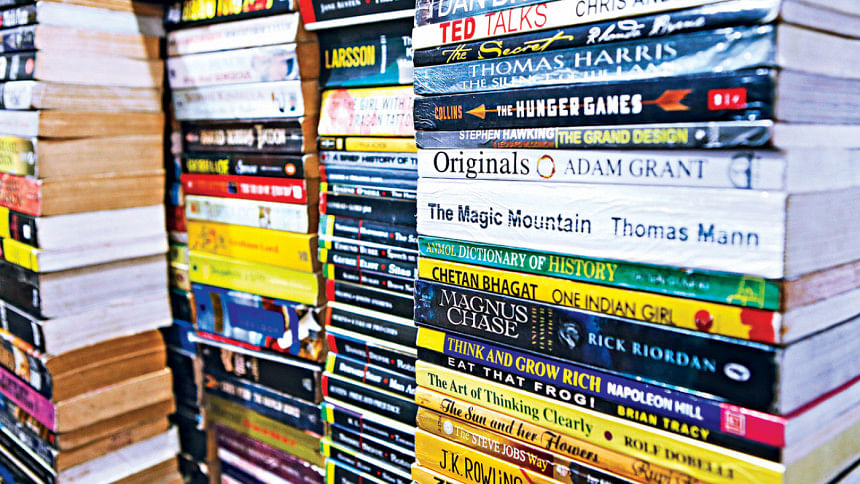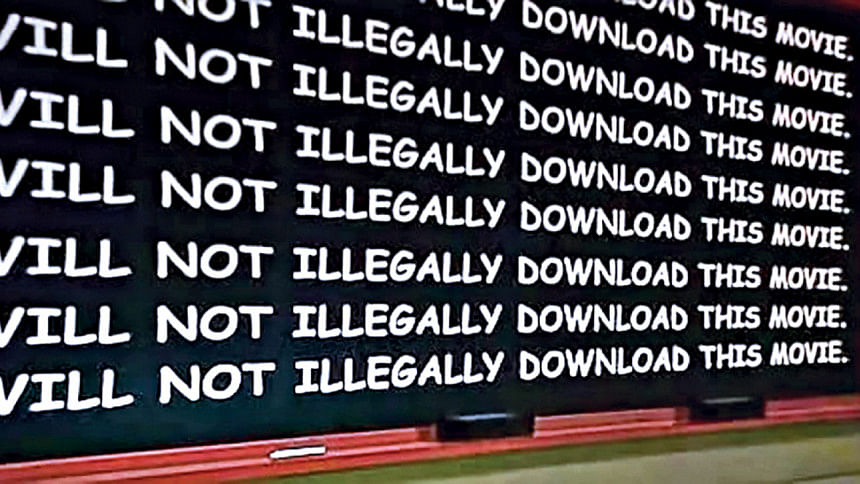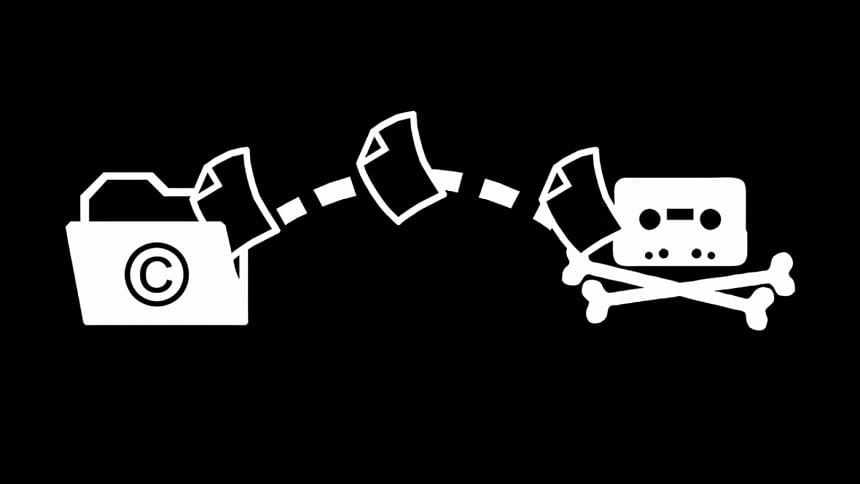WHOSE CONTENT IS IT ANYWAY?

When it comes to entertainment, the demand for pirated content remains in Bangladesh despite the availability of a number of legal alternatives. Streaming services officially available in Bangladesh such as Iflix, Gaan and ones that aren't such as Netflix has not cured the hunger for pirated movies and music in the local market. Pirated copies of books too dominate local shelves. When investigating the reasons as to why pirated music, books, TV shows and movies have the appeal they do, the answers are not as simple as they seem.
MUSIC
In 2016, Bangladesh saw the launch of its first independent mobile music app, Gaan, with the intention of providing a large catalogue of Bangla music to listeners in the country and around the world.

According to Saef Al Nafi, co-founder of the app, there are two main problems which make it difficult for a legal music streaming service to operate in Bangladesh.
"First, it's the mindset of the people. A majority of the people are still not comfortable or aware of the concept of a tech-based platform to stream music from. Second, online payment systems in Bangladesh are not mature enough to support a large business framework such as this. Paying through a subscription mechanism is very easily done abroad but in Bangladesh the digital payment systems that exist are still works in progress. Even bKash is still in its early stage."

Currently, Gaan accepts payment through bKash for local users and Google Pay for overseas users. Soon, however, they will partner with telecom operators to provide the app to their subscribers and accept payment through the operators themselves.
"Piracy is a global problem. It is not just in Bangladesh that people illegally upload other artists' work," continues Saef. It must be mentioned that this culture of piracy is badly hurting local content producers and creators.
"Almost as soon as a song is released, it is ripped, recorded and uploaded online or to YouTube by listeners. It is done all too quickly and easily," he continues.
Companies in Bangladesh aren't totally helpless against those who steal their work. "The technical infrastructure to take pirated music off the internet does exist. Even recently, when music from movies like Aynabaji or Debi was released, people immediately made copies and uploaded it to Facebook and YouTube. However, the authorities took it down almost immediately."
If people only lean towards pirated content, artists do not get paid enough which makes it difficult for new talented musicians to enter the industry. "The problem is that because people are so used to accessing pirated content for free, even if the subsription fee is marginal, people still don't want to pay for music," Saef states.
Gaan currently prices a monthly subscription at BDT 80 per month and a weekly subscription at BDT 35.
"Gaan always tries to feature and promote new musicians. Unless legal services thrive, we can never make sure new artists earn."
Through this all, Saef believes that the market for creative content looks promising. "I am optimistic about the local market," Saef comments. "There is a huge demand for platforms like this – smartphone penetration is huge and people's mindset is slowly changing.
BOOKS
Walking through the crowded thin lanes of Nilkhet overflowing with books from around the world, it isn't hard to realise the enthusiasm of booklovers in the city. The collection here, Dhaka's largest hub of book buying and selling, is enough to comprehend that readers are flooded with a disproportionate number of pirated books over original books.
Md Amin Hossain has been selling books in the market for decades of his working life. He explains, "Original books that are sold here are sold at four times to five times the cost of the local photocopied version. You have to keep in mind that most of our customers here are students who are almost always on a budget."
He also adds, "Original books are supplied less to us than photocopied books. Original books go mostly to different individual shops in the city."
In another shop in the maze of a market that is Nilkhet sits Nurunnabi, who says he is the proprietor of his shop for the past 19 years. "Customers who want to read the book don't want to pay for the original's price," he explains, "Some people want to own an original copy but that's not everyone."
In the new age of social media and online shopping, a large market of book buying and selling has shifted online with many new businesses opening social media pages and websites, delivering books to customers' homes and accepting cash on delivery.
One such operation is Book Stocker. Having opened their business in February 2019, the new venture focuses on selling only local copies of foreign books.
"We conducted a survey before we started our business," explains one of the owners. "And in that survey we found that most people here wouldn't buy original books. So, we focused the business on local print copies and that has worked out well for us."

"Customers will have to spend around 1000 Taka for an original copy of a book. For around the same amount they can read three local print books. And if you are talking about good quality print like we do, the book even looks original."
Operating in an entirely different business model from them is Bookworm Bangladesh, a renowned name in the local literature scene that has been selling only original books to customers for the past 26 years, says manager Babul Mahmood.
He explains how the import of these books work, saying, "All of the shops in Dhaka that sell original books import their collection independently on their own. Previously we would frequently import from the UK but the costs have become too high. Now almost all imports are made from India."
The import taxes factor in too. "We have to pay 15 percent import taxes on top of prices when we buy them in. On top of that another 15 percent VAT is charged on sale. However at our store we pay the VAT to the authorities ourselves without passing on the additional cost to the customers," continues Mahmood.
MOVIES AND TV
Banners of Bangla movies and the promise of television shows from other Asian countries dubbed in Bangla greet visitors to the Iflix website. Iflix made it's entry in the Bangladeshi market in 2017. Headquartered in Kuala Lumpur, Malaysia, this streaming platform focuses on emerging markets such as Bangladesh and is home to a decent collection of both Bangla and international content.
"Since our launch, we have experienced great success," says Arifeen Mahmood Khan, Creative Partnership Manager at Iflix. "We are now the fourth largest (out of 26 countries) in terms of performance. Securing the top position in the South Asian region, we currently have a monthly active user base of 1.5 million which is increasing gradually."
However according to Iflix, the state of digital payment services in Bangladesh is not impacting their business. "Our current business model is completely free i.e. users can enjoy 90 percent of our content without paying for anything. We're working to keep most of our content free but the payment mechanism of our country's digital payment system is not really a hindrance for our business. We believe the local mobile financial services like bKash and Nagad, online and mobile banking platforms have a smooth integration process that makes payments much easier and highly convenient for users," says Khan.
As a large organisation, Iflix has always been proactive in dealing with piracy and their approach to piracy suggests it is possible for all content providers to protect their work.
Khan explains, "We follow the global standard of security protocols within our app to prevent any sort of piracy. However, if some contents do get out through our web platform, we have copyright blocking system in all social media platforms to prevent that. We also have third party multi-channel network service providers to ensure pirated contents get blocked right away."
Global streaming giants Netflix and Amazon Prime too are now players in the Bangladeshi market. Netflix charges USD 7.99 for a basic plan in Bangladesh and boasts an impressive Hollywood-centric catalogue with extremely few Bangladehi titles. Amazon Prime charges USD 2.99 in the first two months and 5.99 from then on. The three leading telecom operators of the country Grameenphone, Banglalink and Robi too have their own streaming platforms – Bioscope, Banglaflix and Robi TV respectively.
Despite the difficulties, the youth population is slowly diverting to consuming content legally while more lawful channels that provide content are entering the market which is testament to the culture slowly shifting.
References
https://www.comparitech.com/blog/vpn-privacy/countries-netflix-cost/
Mrittika Anan Rahman is a daydreamer trying hard not to run into things while walking. Find her at [email protected]

 For all latest news, follow The Daily Star's Google News channel.
For all latest news, follow The Daily Star's Google News channel. 



Comments